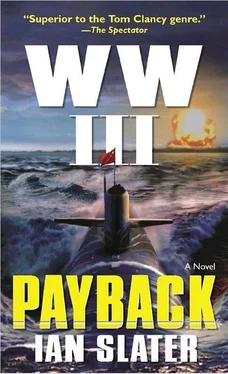It was Freeman’s turn to surprise Aussie, Choir, and Sal. “You’re quite right, Eddie,” the general said. “There’s no doubt we’re heading into wild weather to the west that’ll be pushing down on our right flank, so I figure the best chance of surprise insertion and extraction is a diamond-shape plan of attack. We head 175 miles northwest from McCain ’s battle group here off Ullŭng, then 75 miles southwest to Kosong. Even if the NKA expect an attack, which they won’t because it’s too soon, they’d expect us to come up from the South, either from somewhere along the DMZ or along the coast, certainly not from the north. On the way back, we’ll complete the diamond shape by doing the exact opposite — southeast from Kosong, then wheel northeast back to the battle group.”
“Wheel” reminded Aussie of the general’s famous tank maneuver, and he hoped that the general would have as much success here.
As they dispersed from the ready room, Freeman saw that Choir’s face had not regained its normal color. “You still woozy from the plane ride here?” Freeman asked him pointedly. “Brain fog?”
Brain fog? Mother of God, thought Choir, his face flushing with embarrassment in front of his comrades. “No, sir. I’m fine.”
Freeman nodded, but did Choir glimpse a lingering doubt in the general’s face? The Welsh-American had always known that the kind of air sickness — or, more accurately, the motion sickness — he was prone to could make you “woozy,” as the general had put it, temporarily incapable or at least slower than normal. And the last thing that Payback’s team needed was a member who was slower than normal. Where they were headed, slower meant dead.
Lieutenant Rhee of the North Koreans’ Kosong Coastal Defense Unit 5 had earlier expressed doubts to Colonel Kim and Major Park as to whether or not the American gangsters would dare launch a Special Forces attack against North Korea for fear of enraging the NKA’s Dear Leader Kim Jong Il. Rhee had also suggested that if the Americans did attack North Korea, the MANPAD warehouse at Kosong might not be their target. But now he was reconsidering the opinions he’d given to the colonel and major, in part because such individual initiative was not encouraged in the highly trained and well-equipped NKA, its organization a mirror image of the old Sino/Soviet military structure, where any thinking “outside the box” was immediately suspect, especially when it involved junior officers and the lower ranks. Individuals such as Rhee who strayed in thought from the party line implicitly challenged the infallibility of the Dear Leader.
Still, Rhee knew intuitively that the key to success, as so often demonstrated in the West, was to occasionally demonstrate the willingness to take a risk. And so he thought he might adopt another concept from the decadent West in the same daring spirit the Dear Leader had shown when he’d ordered North Korean special forces to kidnap a capitalist South Korean film director in 1978 to make movies for him. Lieutenant Rhee decided that he would take out some insurance, sending fifteen of his Coastal Defense Unit 5’s fifty-five men to Beach 5, the relatively small half-mile-long crescent of sand near the Kosong warehouse and the sector for which the unit was named. He would split the remaining forty men into three five-man patrols north, south, and west of the warehouse, in effect fanning them out to form a semicircle around the warehouse and the beach directly below, leaving the remaining twenty-five men in Unit 5 to form a “mobile rush” platoon, each soldier mounted on a Chinese-made three-wheel “Red Dragon” vehicle. The powerful off-road runabouts, with their thick, tough, gripping pneumatic tires, were ideal for the cart tracks that augmented the coastal road that ran south past the North’s moodily beautiful Diamond Mountains, the latter an extension of South Korea’s equally rugged south Taebek range.
This vitally strategic road linked Kosong to the North’s port of Wonsan sixty miles to the north, the road overlooked by the towering, snow-covered crags of Mt. Kumgang, which sat majestically just north of the deadly demilitarized zone.
Rhee had “done his time” on patrols along the 2.5-mile-wide, 148-mile-long swath of land mines and high razor-wire fences of the DMZ. DMZ “incidents” following the armistice had caused the death of another 1,638 Koreans and Americans, and so he doubted that the imperialists and their South Korean lackeys would launch any kind of retaliatory attack across the DMZ. It was too carefully guarded. The only problem he had now was waiting to get the signature of Colonel Kim for the release of the twenty-five dragon vehicles he’d ordered, Kim in turn having to receive the written permission of the commander of IV Corps, the latter constituting the NKA’s easternmost deployment of troops, south of the east-west Pyongyang-Wonsan axis.
Rhee, like every other North Korean, had been born and raised in the Hermit Kingdom, so called because of its seclusion and the ludicrous irony of it being the only hard-line Communist state in the iron grip of a royal family — like succession. And so he was used to the extraordinary amount of red tape involved in getting the most minor things accomplished in the military’s bureaucracy. Even so, the lieutenant found it difficult to mask his annoyance with Colonel Kim, who, as CO of the nine-hundred-infantryman battalion to which Unit 5 was assigned, had not yet obtained Pyongyang’s release of the necessary vehicles. It wasn’t as if, Rhee pondered, he’d requested an upgunned laser-sight and snorkel-equipped Chonmaho tank for some mad dash across the DMZ.
Pondering the delay, Rhee wondered if IV Corps HQ, who knew him only as a number, suspected him of wanting the all-terrain vehicles not to bolster his defense of Beach 5 but for a darker, more nefarious reason. Was he a closet kotchebi, one of the so-called Fluttering Swallows, who, in Pyongyang’s words, had turned their back on “the glorious people’s republic of our Dear Leader, wanting instead to flee to the decadent capitalist cesspool of America’s running-dog lackeys in the South”?
In fact, it had never occurred to Rhee to defect. Not only would it mean torture and death if you were captured, but the journey usually involved long, dangerous treks north through mountain hides into China, the DMZ to the south being simply too heavily mined and defended. It meant keeping well away from any kind of road, and if you managed to escape the NKA patrols, there was the treacherous crossing of the wide Yalu River into China where, in all likelihood, government officials would promptly arrest you and return you to North Korea. Of course the swallows could try to escape across the Tumen River in the far northeast into the Chinese and Russian “boot on its side” area south of Lake Khanka, where there were Chinese and Russian border patrols everywhere.
He was thinking more about the kotchebi because of the danger they posed to his sector. Some of them, he knew from personal experience, had tried to escape on small, homemade boats, intending to rendezvous off the coast with South Korean smugglers who dared to make a quick nocturnal dash across the 38th parallel at night to pick up their human cargo. Rhee’s own Unit 5 had foiled the attempted escape of fourteen would-be “fluttering swallows” in the last nine months, a high number for the relatively small patrol area around Kosong and Beach 5.
Indeed, several of his Unit 5 men had been part of a rocket-propelled grenade and small-arms sinking of a smuggler’s boat off Kosong. The smuggler was not as forthcoming about revealing the names of his contacts in the North, and Rhee promptly ordered the man’s legs broken. The Unit 5 squad, using their rifle butts to execute the lieutenant’s command, had gone into a frenzy, their blows a chance to vent their hatred and envy of their Southern neighbors’ affluence and degenerate American morals, evidenced by the centerfolds of naked women that South Korean patrols routinely dropped here and there along the DMZ to goad Rhee’s men. The smuggler, writhing in agony, screamed that the swallows he’d picked up were wanting to go north to the toe of the 20-mile-wide, 150-mile-long “boot” which provided the only direct land access north of the Najin-Sonbong Free Trade Zone to Russia’s far east. Here, in the crowded free-trade zone, surveillance of possible American infiltrators must be difficult. American Special Forces posing as traders might be able to slip through.
Читать дальше












